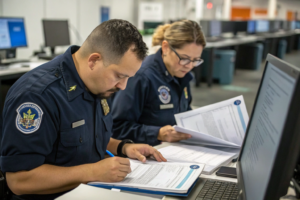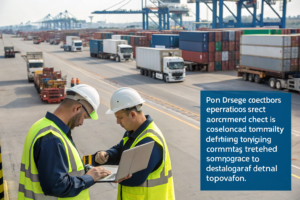Managing bulk shipments is a different game. It’s not just about putting boxes on a ship—it’s about planning space, minimizing costs, and making sure everything arrives together. I’ve worked with importers shipping hundreds of pallets across continents. Without expert freight handling, delays, damages, or misrouted containers can quickly become disasters.
Yes, freight forwarders can manage bulk shipments efficiently by consolidating cargo, optimizing space allocation, reducing freight costs, and ensuring synchronized delivery.
In this article, I’ll break down how experienced freight forwarders like GeeseCargo support importers with complex bulk logistics and offer real value across every stage of the shipping process.
How Do Forwarders Handle Cargo Consolidation and Coordination?
Shipping large quantities isn’t just about volume—it’s about coordination. Bulk goods often come from multiple suppliers or factories, and the forwarder has to combine them smartly.
Forwarders manage bulk shipments through consolidation services like FCL, LCL, and multimodal routing to reduce handling and transit time.

What Is FCL and When Should It Be Used?
FCL (Full Container Load) is ideal for bulk shipments. We recommend it when cargo fills at least 70% of a 20ft or 40ft container. It minimizes handling and transit time. We also ensure container loading plans meet cargo weight limits to avoid penalties.
Can Forwarders Consolidate Cargo From Different Factories?
Absolutely. We offer cargo consolidation services from multiple suppliers across China. Goods arrive at our warehouse, are inspected, labeled, and loaded into a shared container. This method keeps costs low and prevents delays from late suppliers.
How Do Forwarders Plan Vessel and Route Optimization?
Bulk shipping success depends on timing and vessel planning. A missed sailing can throw off your entire supply chain.
Experienced forwarders analyze sailing schedules, port congestion, and transit times to ensure bulk cargo is routed through the fastest and most reliable options.

How Do They Choose the Best Routes?
We evaluate carrier performance via Sea-Intelligence and compare transit times across ports. For bulk shipments from Ningbo to Los Angeles, we check real-time schedules from MarineTraffic and prioritize direct routes to avoid transshipment delays.
What Happens When Vessel Capacity Is Tight?
In peak seasons, vessel space is limited. We secure bulk cargo slots in advance and work with multiple carriers to hold backup options. We also use services like Xeneta to track market rates and negotiate long-term contracts, keeping your rates stable.
How Do Forwarders Improve Handling and Damage Prevention?
The bigger the shipment, the greater the risk of damage or loss—unless it's handled by professionals.
Forwarders handle bulk shipments with strict packing, palletizing, and labeling standards that reduce in-transit damage and improve customs clearance success.

How Do They Ensure Safe Loading?
We use cargo securing standards like blocking and bracing inside containers. For fragile or heavy goods, we supervise custom crating and apply weather protection when needed. Before sealing, our team documents cargo conditions with timestamped photos.
What Role Does Labeling and Inspection Play?
Bulk shipments often involve thousands of SKUs. We label every carton with destination, item code, and barcode (if required). For clients with compliance needs, we also conduct pre-shipment inspections and generate packing reports to satisfy customs and warehouse staff at destination.
How Do Forwarders Keep Bulk Shipments on Schedule?
Large shipments can be delayed by a single misstep—port congestion, trucking issues, or missing documents.
Freight forwarders use real-time tracking and milestone-based management to ensure bulk shipments stay on schedule.

What Systems Are Used for Live Monitoring?
We rely on platforms like FourKites, GoFreight, and Logixboard to monitor container movement, customs clearance, and final delivery. Clients receive automated status updates, helping them plan warehouse labor and inventory flow.
How Do They Handle Unexpected Delays?
Delays happen—but how we respond matters most. If a bulk container is rolled to the next vessel, we activate our alternate routing plan. If customs causes delays, we send documentation teams directly to the terminal to resolve issues fast. Our escalation SOP ensures zero time is lost when resolving bulk issues.
Conclusion
Bulk shipments require more than just extra containers—they need strategy, speed, and precision. From supplier consolidation and routing to damage control and live tracking, freight forwarders like GeeseCargo take the chaos out of bulk cargo logistics. Whether you're shipping apparel, gifts, or general merchandise at scale, we help you move more—faster, safer, and smarter.









